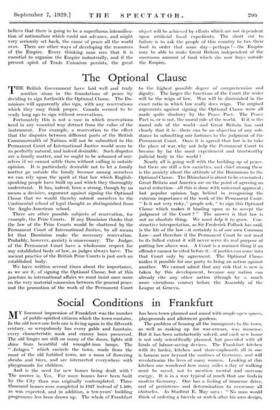The Optional Clause
THE British Government have laid well and truly another stone in the foundations of peace by deciding to sign forthwith the Optional Clause. The Do- minions will apparently also sign, with any reservations which they may think proper. Canada seemed to be ready long ago to sign without reservations.
Fortunately this is not a case in which reservations need in any essential way detract from the value of the instrument. For example, a reservation to the effect that the disputes between different parts of the British Commonwealth of Nations will not be submitted to the Permanent Court of International Justice would seem to us perfectly natural, and indeed desirable. Such disputes are a family matter, and we ought to be ashamed of our- selves if we cannot settle them without calling in outside opinion. It is particularly desirable not to let a family matter go outside the family because among ourselves we can rely upon the spirit of that law which English- speaking people have built up and which they thoroughly Understand. It has, indeed, been a strong, though by no means a decisive, argument against signing the Optional Clause that we would thereby submit ourselves to the Continental school of legal thought as distinguished from the Anglo-American school.
There are other possible subjects of reservation, for example, the Prize Courts. If any Dominion thinks that the law of the Prize Courts would be shattered by the Permanent Court of International Justice, by all means let that Dominion make the necessary reservation. Probably, however, anxiety is unnecessary. The Judges of the Permanent Court have a wholesome respect for any established body of law, as judges always have. The ancient practice of the British Prize Courts is just such an established body.
We have written several times about the importance, as we see it, of signing the Optional Clause, but at this juncture in international affairs we must insist once more on the very material connexion between the general peace and the promotion of the work of the Permanent Court to the highest possible degree of comprehension and dignity. The larger the functions of the Court the wider will be the reign of law. War will be diminished in the exact ratio in which law really does reign. The original arguments against signing the Optional Clause were all made quite shadowy by the Peace Pact. The Peace Pact is, or is not, the moral rule of the world. If it is the moral rule of the world—and Great Britain has said clearly that it is—there can be no objection of any sub- stance to submitting our fortunes to the judgment of the Permanent Court. Once it is agreed that law is to take the place of war, why not help the Permanent Court to become by far the most experienced and trustworthy judicial body in the world ?
Nearly all is going well with the building up of peace, but there are still a few anxieties, and chief among these is the anxiety about the attitude of the Dominions to the Optional Clause. The Rhineland is about to be evacuated ; Great Britain and America are on the point of agreeing on naval reduction—all this is done with universal approval ; but popular opinion lags behind in recognizing the extreme importance of the work of the Permanent Court. " Is it not very risky," people ask, " to sign this Optional Clause which makes it binding upon us to accept the judgment of the Court ? " The answer is that law is not an absolute thing. We must help it to grow. Con- structive interpretation, as Sir Frederick Pollock has said, is the life of the law—it certainly is of our own Common Law—and therefore if the Permanent Court be not used to its fullest extent it will never serve its real purpose of putting law above war. A Court is a maimed thing if an offender cannot be cited before it—if parties can conic into that Court only by agreement. The Optional Clause makes it possible for one party to bring an action against another. We cannot admit that any risk that is new is taken by this development, because any nation can already cite any other nation (though by a much more circuitous course) before the Assembly of the League at Geneva.
































 Previous page
Previous page